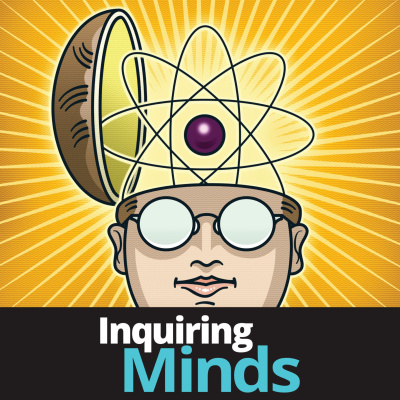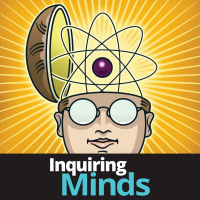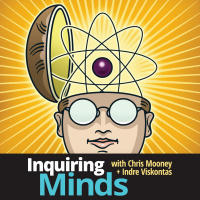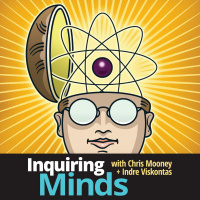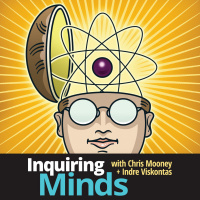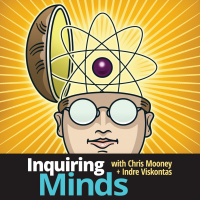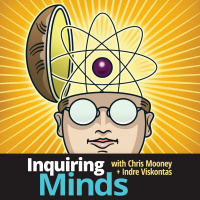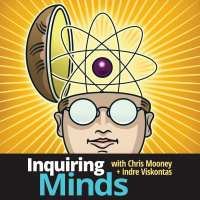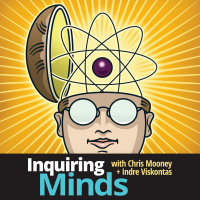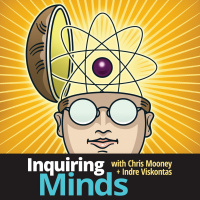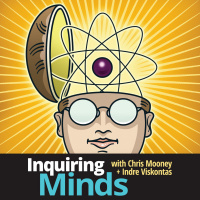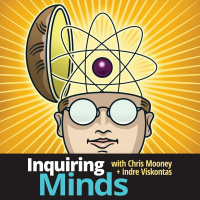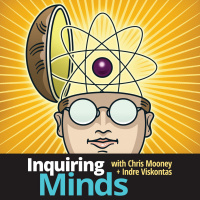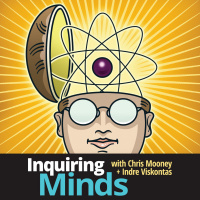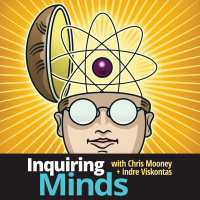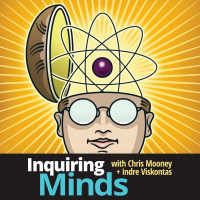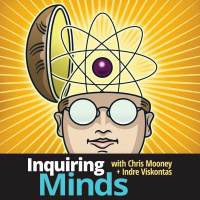Sinopsis
Each week Inquiring Minds brings you a new, in-depth exploration of the place where science, politics, and society collide. Were committed to the idea that making an effort to understand the world around you though science and critical thinking can benefit everyoneand lead to better decisions. We endeavor to find out whats true, whats left to discover, and why it all matters with weekly coverage of the latest headlines and probing discussions with leading scientists and thinkers. Produced in partnership with Climate Desk, a journalistic collaboration dedicated to exploring the impact of a changing climate and consisting of The Atlantic, Center for Investigative Reporting, Grist, The Guardian, Mother Jones, Slate, and Wired.
Episodios
-
61 George Church - Hacking Mosquitoes to Fight Malaria
21/11/2014 Duración: 48minOn the show this week guest host Cynthia Graber talks to George Church—a professor of genetics at Harvard Medical School and the author of Regenesis: How Synthetic Biology Will Reinvent Nature and Ourselves. Church explains how, using cutting-edge genetic manipulation techniques, we may be able to help eradicate some of the world's worst diseases.Cynthia and Church also talk about everything from HIV/AIDS research to efforts to engineer an animal that will closely resemble the long-extinct woolly mammoth.iTunes: itunes.apple.com/us/podcast/inquiring-minds/id711675943RSS: feeds.feedburner.com/inquiring-mindsStitcher: stitcher.com/podcast/inquiring-mindsSupport the show: https://www.patreon.com/inquiringminds
-
60 Paul Bloom - Babies and the Origins of Good and Evil
14/11/2014 Duración: 01h42sOn the show this week we talk to cognitive scientist Paul Bloom about the morality of babies. Most of us think of babies as selfish, impulsive, and for the most part out of control. We tend to think of their morality as shaped by experience—by society, by their parents, by early childhood events. But Bloom and his collaborators at Yale have some pretty compelling evidence that at least some parts of our moral compass are innate—that is that babies are born with the capacity to tell good from bad just as they are born with a capacity to develop motor or language skills. And by understanding how our morality develops throughout childhood, we can gain some insight into how our own gut feelings and biases shape our moral lives as adults.We also welcome guest-host Kishore Hari, director of the Bay Area Science Festival, to talk about, among other things, a recent study involving brains and spiders.iTunes: itunes.apple.com/us/podcast/inquiring-minds/id711675943RSS: feeds.feedburner.com/inquiring-mindsStitcher: sti
-
59 David Grinspoon - The Science of Interstellar
07/11/2014 Duración: 53minOn the show this week we welcome guest host David Corn, political journalist and Washington bureau chief for Mother Jones. Corn interviews astrobiologist David Grinspoon about the science behind Christopher Nolan’s new movie, Interstellar—what it gets right, and what it gets wrong.Corn also talks to Indre about what the recent elections mean for those of us who value science. Spoiler: it’s not looking great.iTunes: itunes.apple.com/us/podcast/inquiring-minds/id711675943RSS: feeds.feedburner.com/inquiring-mindsStitcher: stitcher.com/podcast/inquiring-mindsSupport the show: https://www.patreon.com/inquiringminds
-
58 Adam Savage - Live on Stage in San Francisco
31/10/2014 Duración: 36minOn the show this week Indre talks to Adam Savage about the future of science communication (and why it’s terrifying TV networks), why he’s worried Elon Musk might become a Marvel supervillain, and why it’s so important to him that women be better represented in his field. Indre also talks to host of The Story Collider, Ben Lillie, about the Antares Rocket explosion, flavonols, and Ben explains why he's fascinated by institutional review boards. This episode was recorded live on stage in San Francisco as part of the 2014 Bay Area Science Festival.Support the show: https://www.patreon.com/inquiringminds
-
57 William Gibson - The Future Will View Us as a Joke
24/10/2014 Duración: 57minOn the show this week we talk to author William Gibson about time travel, cronuts, and his new 22nd century novel.We also talk to infectious disease doctor and co-founder of Wellbody Alliance, Dan Kelly, who is currently in Sierra Leone fighting the Ebola outbreak. Kelly explains what the situation looks like from the ground, what work he’s doing there, and what we can do to help.iTunes: itunes.apple.com/us/podcast/inquiring-minds/id711675943RSS: feeds.feedburner.com/inquiring-mindsStitcher: stitcher.com/podcast/inquiring-mindsSupport the show: https://www.patreon.com/inquiringminds
-
56 Steven Johnson - Innovations That Made the Modern World
17/10/2014 Duración: 52minOn the show this week we talk to Steven Johnson, author of the new book How We Got to Now: Six Innovations That Made the Modern World. In it, Johnson argues that seemingly mundane scientific breakthroughs have changed our world in profound ways—impacting everything from life expectancy to women's fashion.We also welcome guest host Cynthia Graber who talks about a recent article she wrote for Nova on the “Diseaseome”; and Indre wonders if you are, in fact, smarter than a kindergartner.iTunes: itunes.apple.com/us/podcast/inquiring-minds/id711675943RSS: feeds.feedburner.com/inquiring-mindsStitcher: stitcher.com/podcast/inquiring-mindsSupport the show: https://www.patreon.com/inquiringminds
-
55 Daniel Levitin - The Organized Mind
10/10/2014 Duración: 01h09minOn the show this week we talk to cognitive psychologist, neuroscientist, musician, and writer Daniel Levitin about his new book The Organized Mind: Thinking Straight in the Age of Information Overload. We also talk to microbiologist Siouxsie Wiles about the Ebola virus—what the risks really are, and why many people might be overreacting. Also, Chris has a huge announcement.Support the show: https://www.patreon.com/inquiringminds
-
54 Steven Pinker - The Science Behind Writing Well
02/10/2014 Duración: 48minSan Francisco! Come see us interview Adam Savage live on Oct. 28!http://www.bayareascience.org/event/im-story-collider/On the show this week we talk to celebrated Harvard cognitive scientist and psycholinguist Steven Pinker about his new book The Sense of Style: The Thinking Person's Guide to Writing in the 21st Century.Pinker explains how to write in clear, "classic" prose that shares valuable information with clarity (but never condescension). He also tells us why so many of the tut-tutting grammar "rules" that we all think we're supposed to follow—don't split infinitives, don't use the passive voice, don't end a sentence with a preposition—are just nonsense.iTunes: itunes.apple.com/us/podcast/inquiring-minds/id711675943RSS: feeds.feedburner.com/inquiring-mindsStitcher: stitcher.com/podcast/inquiring-mindsSupport the show: https://www.patreon.com/inquiringminds
-
53 Naomi Klein - Climate Changes Everything
26/09/2014 Duración: 01h02minCome see us interview Adam Savage live in San Francisco on Oct. 28!http://www.bayareascience.org/event/im-story-collider/On the show this week we talk to author and social activist Naomi Klein about her new book This Changes Everything: Capitalism vs. the Climate. In it, Klein argues that we are past the time when incremental change can get us to where we need to be to properly address the challenge of climate change—we’re in a situation, she says, where no non-radical choices are left.This episode also features a discussion on new research that suggests gut bacteria could be affecting our minds, and a study that examines the cross-species influence of a babies’ cries.iTunes: itunes.apple.com/us/podcast/inquiring-minds/id711675943RSS: feeds.feedburner.com/inquiring-mindsStitcher: stitcher.com/podcast/inquiring-mindsSupport the show: https://www.patreon.com/inquiringminds
-
52 Al Gore - The Politics of Climate Change
17/09/2014 Duración: 34minOn the show this week we talk to former Vice President Al Gore. He shares his thoughts on President Obama's global warming record, the upcoming United Nations climate meeting, the impact of fracking, and China's plans for a massive carbon market.This episode also features a discussion inspired by an article written by Cailin O’Connor at Slate on the often overlooked influence of random noise on our cells—and its influence on genetics.http://www.slate.com/articles/health_and_science/science/2014/09/random_noise_in_biology_why_genetically_identical_twins_aren_t_identical.htmliTunes: itunes.apple.com/us/podcast/inquiring-minds/id711675943RSS: feeds.feedburner.com/inquiring-mindsStitcher: stitcher.com/podcast/inquiring-mindsSupport the show: https://www.patreon.com/inquiringminds
-
51 Brendan Nyhan - Will Facts Matter in the 2014 Election?
12/09/2014 Duración: 58minOn the show this week we talk to Dartmouth political scientist Brendan Nyhan, who has focused much of his research on employing the tools of social science to study fact-checking—why it so often fails, and what can be done to make it work better. The cynical view on fact-checking is "too negative," argues Nyhan. "I think you have to think about what politics might look like without those fact-checkers, and I think it would look worse."This episode is guest co-hosted by Rebecca Watson of skepchick.org, filling in for Indre who is out this week. It also features a discussion of a new study suggesting that religious and non-religious individuals are equally moral, and new research on gender discrimination in job performance evaluations, particularly by men with traditional views of gender roles.iTunes: itunes.apple.com/us/podcast/inquiring-minds/id711675943RSS: feeds.feedburner.com/inquiring-mindsStitcher: stitcher.com/podcast/inquiring-mindsSupport the show: https://www.patreon.com/inquiring
-
50 William Poundstone - Understanding Randomness
05/09/2014 Duración: 52minOn the show this week we talk about randomness with science writer William Poundstone, author of the new book Rock Breaks Scissors.Poundstone explains why we’re so terrible at trying to come up with random sequences ourselves—and how understanding these pitfalls can actually help you predict, with accuracy above chance, what someone else is going to do even when he or she is trying, purposefully, to act randomly.These predictions are at the core of Poundstone's book, which offers a practical guide to outguessing and outwitting almost anybody—in activities ranging from Rock, Paper, Scissors (men tend to go with rock, so you can beat them with paper) to investing in stocks.On the show this week we also talk about researchers who are growing mushrooms on diapers to help them biodegrade and Chris disagrees with Neil deGrasse Tyson about something (but still loves him).iTunes: itunes.apple.com/us/podcast/inquiring-minds/id711675943RSS: feeds.feedburner.com/inquiring-mindsStitcher: stitcher.com/podcast/inquiring-mi
-
49 Arie Kruglanski - The Science of What Makes a Terrorist
29/08/2014 Duración: 47min"Its Islam over everything."So read the Twitter bio of Douglas McAuthur McCain—or, as he reportedly called himself, "Duale Khalid"—the San Diego man who is apparently the first American to be killed while fighting for ISIS. According to NBC News, McCain grew up in Minnesota, was a basketball player, and wanted to be a rapper. Friends describe him as a high school "goofball" and "a really nice guy." So what could have made him want to join the ranks of other Americans drawn towards militant Islam like John Walker Lindh and Al Qaeda spokesman Adam Yahiye Gadahn? And how can we explain the dozens of other Americans who have also gone off to fight as jihadists in Syria, for ISIS and other militant groups?According to University of Maryland psychologist and terrorism expert Arie Kruglanski, who has studied scores of militant extremists, part of the clue may lie in that Twitter tagline of McCain's. Not just its content, but the mindset that it indicates—one that sees the worl
-
48 K Clancy, R Nelson, J Rutherford, & K Hinde - The Epidemic of Harassment in Scientific Field Work
22/08/2014 Duración: 01h01minOne of the most difficult parts of getting a Ph.D. is finishing your dissertation. Beyond the mountain of work a dissertation requires, graduate students also have to face feelings of inadequacy, disappointment, and anxiety about the looming job search. Sometimes, they need a gentle, supportive push to quit stressing about every last comma and—after years of blood, sweat, and tears— finally turn it in.So when Kate Clancy, an anthropologist at the University of Illinois at Urbana-Champaign, chided an old friend who was still a graduate student about taking that last step to finish her thesis, she thought she was doing her a favor. But she was floored by her friend's response.Clancy remembers her friend saying, "Well, I was sexually assaulted in the field, and every time I open the dissertation files I have flashbacks." That conversation, says Clancy, "was the first time that it really hit me how much these kinds of experiences can not only emotionally traumatize women, but also explicitly hold t
-
47 Anthony Ingraffea - The Science of Fracking
15/08/2014 Duración: 59minOn the political right, it's pretty popular these days to claim that the left exaggerates scientific worries about hydraulic fracturing, or "fracking." In a recent National Review article, for instance, a Hoover Institution researcher complains that 53 percent of Democrats in California support a fracking ban "despite the existence of little if any credible scientific evidence of fracking's feared harms and overwhelming scientific evidence of its environmental benefits, including substantial reductions in both local and global pollutants."Three or four years ago, a statement like that may have seemed defensible. The chief environmental concern about fracking at that time involved the contamination of drinking water through the fracking process—blasting water, sand, and chemicals underground in vast quantities and at extreme pressures to force open shale layers deep beneath the Earth, and release natural gas. But the science was still pretty ambiguous, and a great deal turned on how "f
-
46 David Casarett - The Science of Death
08/08/2014 Duración: 56minOn the show this week we talk to University of Pennsylvania professor of medicine David Casarett about his book Shocked: Adventures in Bringing Back the Recently Dead.Casarett explains the science of resuscitation—and what exactly it means to be “dead.” We talk about cryonics, the idea that you might be able to preserve your brain—or your whole body—by freezing it immediately after you die, and then bring it back to life in the future once science figures out how to do that. We also talk to Casarett about how likely it is that one day we might be able to put humans in a state of hibernation or suspended animation.This episode also features a conversation with Tara Smith, an epidemiologist who is an expert on the Ebola virus, and has been debunking a large number of myths about the latest outbreak.iTunes: itunes.apple.com/us/podcast/inquiring-minds/id711675943RSS: feeds.feedburner.com/inquiring-mindsStitcher: stitcher.com/podcast/inquiring-mindsSupport the show: https://www.patreon.com/inquiringminds
-
45 Barb Oakley - The Science of Learning
31/07/2014 Duración: 54minCharles Dickens, perhaps the greatest of the Victorian novelists, was a man of strict routine. Every day, notes his biographer Claire Tomalin, Dickens would write from 9:00 am to 2:00 pm. After that, he would put his work away and go out for a long walk. Sometimes he walked as far as 30 miles; sometimes, he walked into the night. "If I couldn't walk fast and far, I should just explode and perish," Dickens wrote.According to engineering professor Barbara Oakley, author of the new book A Mind for Numbers: How to Excel at Math and Science (Even If You Flunked Algebra), Dickens wasn't just a guy who knew how to keep himself healthy. Rather, his habits are indicative of someone who has figured out how to make his brain function at a very high level. And for this, Dickens' walks were just as important as his writing sessions. "That sort of downtime, when you're not thinking directly about what you're trying to learn, or figure out, or write about—that downtime is a time of subconscious processing tha
-
44 David Epstein - The Science Behind the World's Greatest Athletes
25/07/2014 Duración: 01h09minWhat makes a great athlete? Talent? Training? Or is mostly genetic?On the show this week we get some answers from sports writer David Epstein while discussing his new book The Sports Gene: Inside the Science of Extraordinary Athletic Performance.Epstein explains a lot—from why growing up in a small town increases your likelihood of becoming a professional athlete to how softball pitcher Jennie Finch made striking out so many Major League Baseball batters during the 2004 Pepsi All-Star Softball Game look easy.This episode also features a discussion with pediatrician Clay Jones about the terrifying consequences of parents refusing Vitamin K shots for their newborns; and we talk about a new study that attempted to experimentally test the idea that we're "born believers."iTunes: itunes.apple.com/us/podcast/inquiring-minds/id711675943RSS: feeds.feedburner.com/inquiring-mindsStitcher: stitcher.com/podcast/inquiring-mindsSupport the show: https://www.patreon.com/inquiringminds
-
43 Naomi Oreskes - The Collapse of Western Civilization
18/07/2014 Duración: 54minYou don't know it yet. There's no way that you could. But 400 years from now, a historian will write that the time in which you're now living is the "Penumbral Age" of human history—meaning, the period when a dark shadow began to fall over us all. You're living at the start of a new dark age, a new counter-Enlightenment. Why? Because too many of us living today, in the years just after the turn of the millennium, deny the science of climate change.Such is the premise of a thought-provoking new work of "science-based fiction" by Naomi Oreskes and Erik Conway, two historians of science best known for their classic 2010 book, Merchants of Doubt: How a Handful of Scientists Obscured the Truth on Issues from Tobacco Smoke to Global Warming. In a surprising move, they have now followed up that expose of the roots of modern science denialism with a work of "cli-fi," or climate science fiction, entitled The Collapse of Western Civilization: A View from the Future. In it, Oreskes and Conw
-
42 Arthur I. Miller - How Science Is Revolutionizing Art
11/07/2014 Duración: 01h36sOn the show this week we welcome Arthur I. Miller—physics Ph.D., science historian, philosopher—and an art aficionado to boot. We talked to Miller about his new book, Colliding Worlds: How Cutting-Edge Science is Redefining Contemporary Art, in which he makes the case for the existence of a "third culture" that, today, is mashing together art, science, and technology into one big domain. "There are still people who think science is science, and art is art," says Miller. "But that is very far from the situation because it is very, very common and meaningful today for artists to indulge in science and technology in doing their work."This episode also features a short discussion with Joe Hanson, writer and host of the "It's Okay to Be Smart" video series, about the science of Game of Thrones, what blowing on Nintendo cartridges has to do with your cognitive biases, new evidence disproving Bigfoot, the relationship between seeing UFOs and alcohol consumption, why men born i
